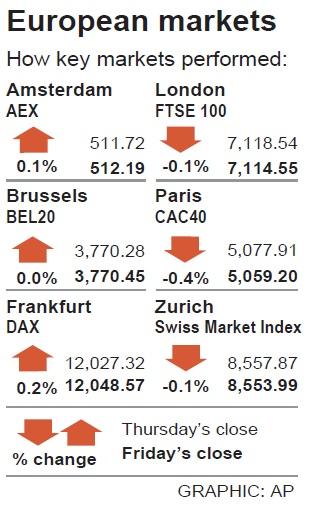European shares were little changed on Friday, while France’s stock market dropped in the final trading session before the nation’s presidential election today.
The STOXX Europe 600 closed little changed at 378.12 in London. France’s CAC 40 Index fell 0.4 percent, trimming an earlier drop of as much as 1 percent.
The European regional benchmark saw a weekly drop of 0.6 percent, its steepest since late January.

The latest Opinionway poll showed support for independent candidate Emmanuel Macron and far-right contestant Marine Le Pen was stable at 23 percent and 22 percent respectively.
French voters go to the polls in a first-round vote, with Macron and Le Pen the frontrunners to advance to the final election next month.
The murder of a policeman on the Champs-Elysees has forced an early end to campaigning for the leading candidates, with the race wide open, according to polls.
“The possibility of a hard-right Marine Le Pen presidency has worried markets for some time, but another risk scenario to consider is the victory of far-left leader Jean-Luc Melenchon,” Roubini Global Economics senior economist Lars Lundqvist said. “If either Le Pen or Melenchon make it to the second round, markets would stay on their toes a bit longer.”
Danone SA dropped as much as 2.9 percent after reporting the third consecutive quarterly drop in volume and including its US$10 billion takeover of WhiteWave Foods Co in its organic growth for the year.
European equities are still priced for a slight valuation premium linked to acceleration in global growth momentum and are not reflecting an “obvious political risk discount,” Deutsche Bank AG strategists, including Sebastian Raedler, wrote in a note.
Investors in European lenders are getting cold feet. Bets for swings in lenders’ stocks have jumped and options reached their highest prices since February last year relative to those for euro-area blue chips.

In Italy’s storied gold-making hubs, jewelers are reworking their designs to trim gold content as they race to blunt the effect of record prices and appeal to shoppers watching their budgets. Gold prices hit a record high on Thursday, surging near US$5,600 an ounce, more than double a year ago as geopolitical concerns and jitters over trade pushed investors toward the safe-haven asset. The rally is putting undue pressure on small artisans as they face mounting demands from customers, including international brands, to produce cheaper items, from signature pieces to wedding rings, according to interviews with four independent jewelers in Italy’s main

Japanese Prime Minister Sanae Takaichi has talked up the benefits of a weaker yen in a campaign speech, adopting a tone at odds with her finance ministry, which has refused to rule out any options to counter excessive foreign exchange volatility. Takaichi later softened her stance, saying she did not have a preference for the yen’s direction. “People say the weak yen is bad right now, but for export industries, it’s a major opportunity,” Takaichi said on Saturday at a rally for Liberal Democratic Party candidate Daishiro Yamagiwa in Kanagawa Prefecture ahead of a snap election on Sunday. “Whether it’s selling food or

CONCERNS: Tech companies investing in AI businesses that purchase their products have raised questions among investors that they are artificially propping up demand Nvidia Corp chief executive officer Jensen Huang (黃仁勳) on Saturday said that the company would be participating in OpenAI’s latest funding round, describing it as potentially “the largest investment we’ve ever made.” “We will invest a great deal of money,” Huang told reporters while visiting Taipei. “I believe in OpenAI. The work that they do is incredible. They’re one of the most consequential companies of our time.” Huang did not say exactly how much Nvidia might contribute, but described the investment as “huge.” “Let Sam announce how much he’s going to raise — it’s for him to decide,” Huang said, referring to OpenAI

The global server market is expected to grow 12.8 percent annually this year, with artificial intelligence (AI) servers projected to account for 16.5 percent, driven by continued investment in AI infrastructure by major cloud service providers (CSPs), market researcher TrendForce Corp (集邦科技) said yesterday. Global AI server shipments this year are expected to increase 28 percent year-on-year to more than 2.7 million units, driven by sustained demand from CSPs and government sovereign cloud projects, TrendForce analyst Frank Kung (龔明德) told the Taipei Times. Demand for GPU-based AI servers, including Nvidia Corp’s GB and Vera Rubin rack systems, is expected to remain high,